
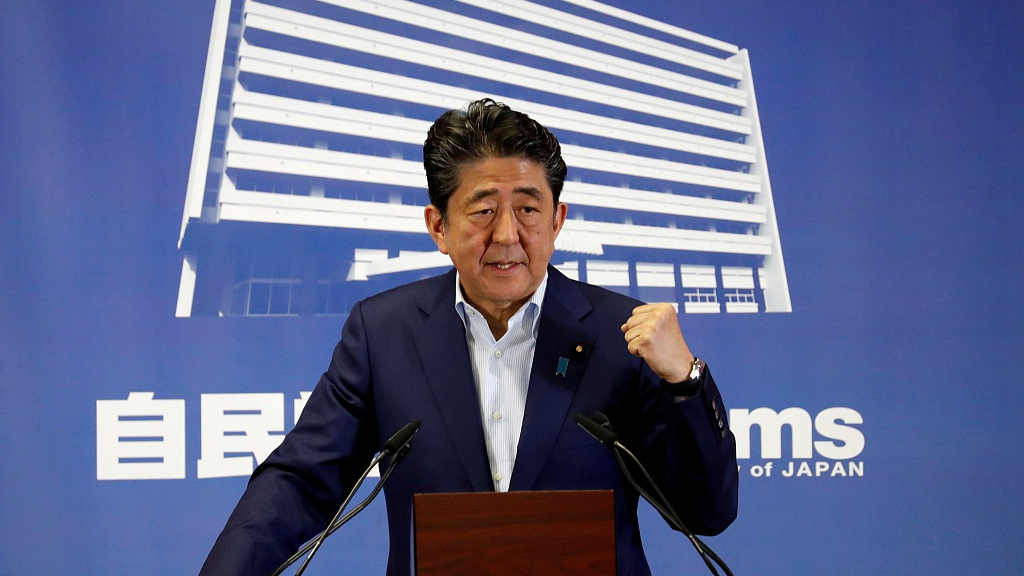
Japan's Prime Minister Shinzo Abe, also leader of the Liberal Democratic Party (LDP), attends a news conference a day after an upper house election at LDP headquarters in Tokyo, Japan, July 22, 2019. /VCG Photo
Japanese Prime Minister Shinzo Abe's ruling coalition has secured a majority victory in Sunday's upper house election while falling short of the "super majority" needed for his long-held hope of constitutional reform.
Solid majority win
The ruling parties – the coalition of the Liberal Democratic Party and Komeito, secured 71 of the 124 seats up for grabs in the House of Councilors, crossing the line set by senior party executives for determining victory. This maintains their majority in the 245-member upper house, combined with the 70 uncontested seats they already hold.
Speaking during a TV program as results started coming in, Abe said they showed voters choosing political stability, as he had called for during the election campaign.
"We've secured a mandate to steadily carry out our politics," Abe, on course to be Japan's longest-serving prime minister in November, said.
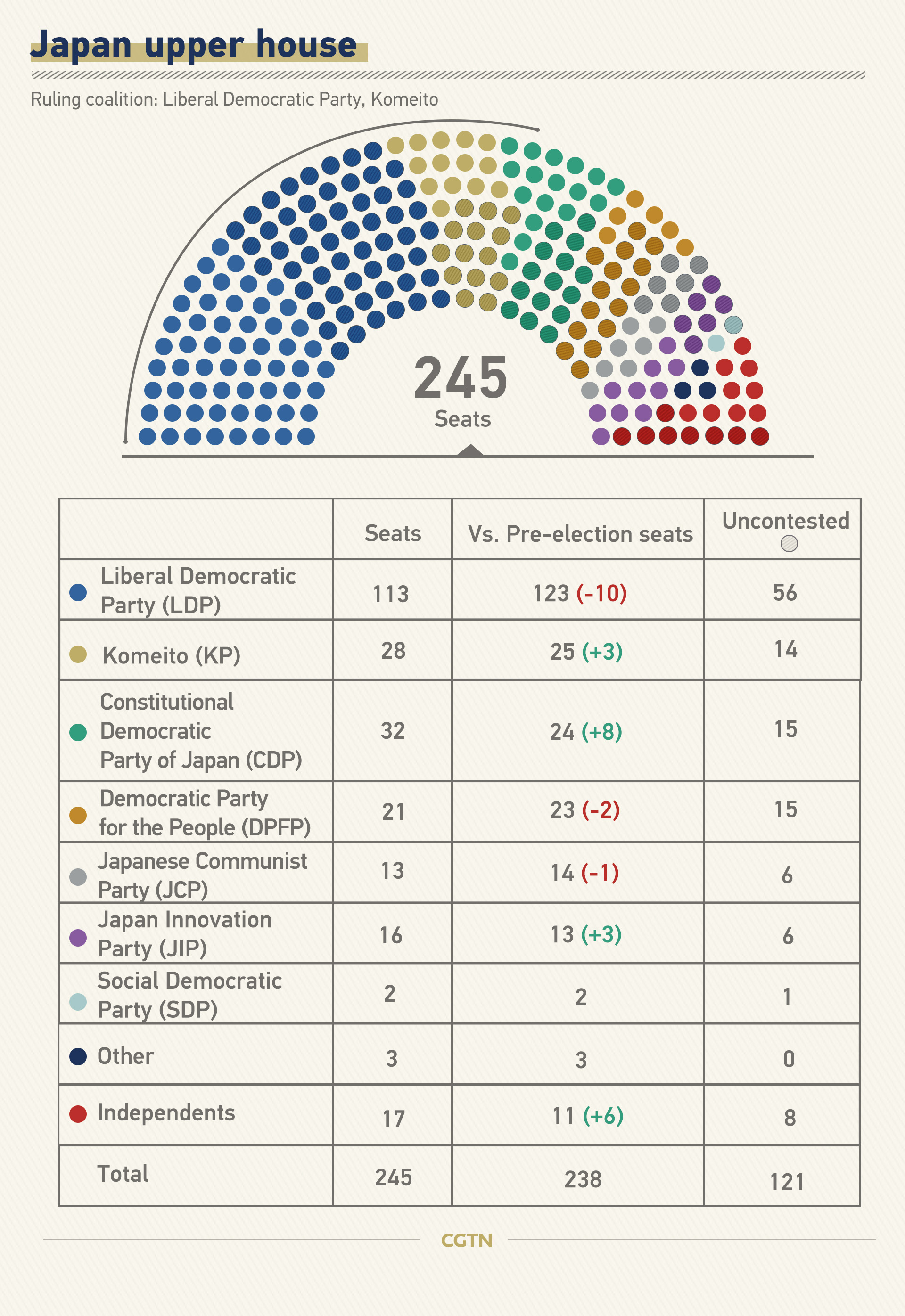
Two-thirds majority failure
The ruling party, along with like-minded opposition and independent lawmakers, fell short of the two-thirds "super majority" (164 seats) needed in the chamber to propose amending the pacifist constitution and calling a national referendum on the issue.
With 79 uncontested seats, the pro-amendment camp needed to win at least 85 seats to maintain its two-thirds majority in the upper house. The ruling bloc has a two-thirds majority of 312 seats out of 465 in the powerful House of Representatives.
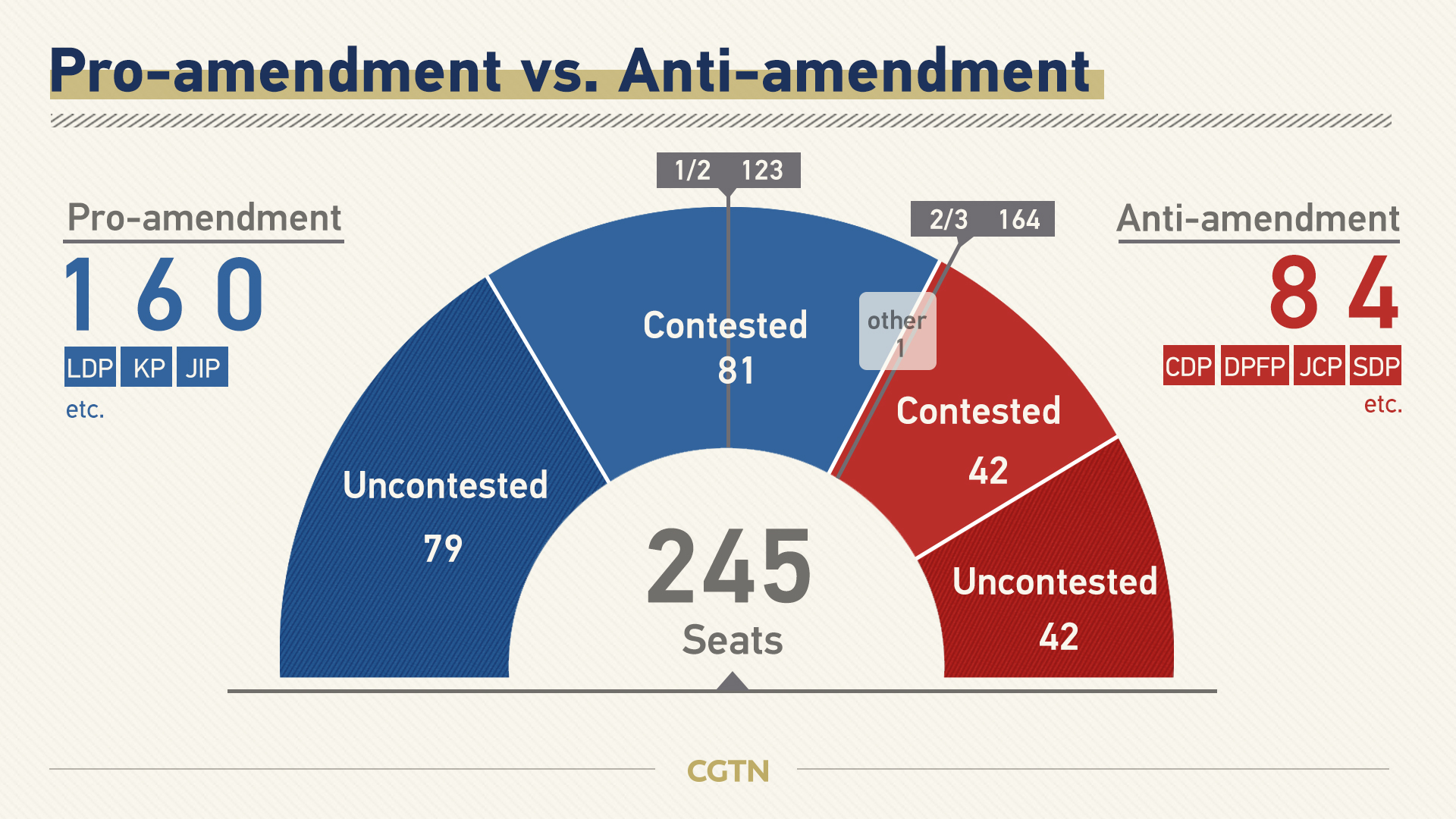
Abe has set his sights on having a revised Constitution in 2020 but the pro-amendment camp's failure means the LDP leader faces the daunting task of convincing opposition parties if he wants to achieve his goal as planned.
During a news conference on Monday, Abe pledged to keep alive his plans to amend the pacifist constitution.
"The hurdle of two thirds in both the lower and upper houses is extremely high," Abe said. "I want to produce a reform proposal that can be agreed upon by two thirds beyond the borders of the ruling and opposition camps."
Abe called for debate on revising the pacifist constitution, saying Sunday's election result showed it was what voters wanted. He is expected to try to win backing from members of the second-largest opposition party, the Democratic Party for the People.
"The judgment of the people was that debate should take place," Abe said. "I want to have serious debate that goes beyond the boundaries of ruling versus opposition parties."
Abe has long harbored dreams of revising the constitution, which prohibits the country from waging war and maintaining a military. He wants to add wording that makes explicit the legality of Japan's Self-Defense Forces to the war-renouncing Article 9 of the constitution. The document has remained unchanged since it was enacted after Japan's defeat in World War Two.
But public support for revising the document is low and there is discomfort with the idea even among the ruling coalition.
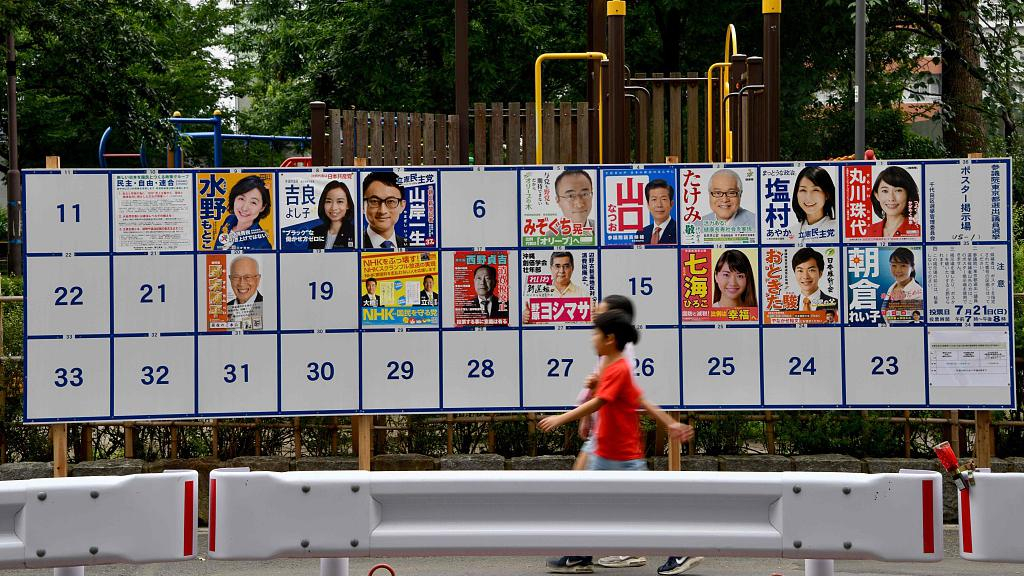
Children walk in front of upper house election posters in Tokyo, July 20, 2019. /VCG Photo
Recent media surveys showed many voters did not regard it as a top priority issue during the campaign, as they focused more on pension and tax issues as well as economic policies.
The ruling and opposition parties remain divided over revising the war-renouncing Article 9, a symbol of Japan's postwar pacifism, as has been the case among the public. Even within the ruling coalition, many lawmakers from Komeito are cautious about the idea.
Experts said that since many within Abe's coalition were already uneasy about the plans, the failure to secure a super majority was unlikely to change the prime minister's calculations significantly.
Record-low turnout
Turnout in the election, however, fell at 48.80 percent, the second lowest on record, according to a Kyodo News estimate.
Political analysts said this year's upper house election failed to receive much attention due to a lack of clear-cut differences on issues, and a perceived lack of viable alternatives among a fragmented opposition camp. Analysts said Abe's coalition benefited from a weak opposition.
Members of the upper house serve six-year terms, with about half the seats up for grabs every three years. Due to electoral reform, the number of seats in the upper house will increase by six to 248 in 2022. Of the six, three were added this time to bring the total seats to 245.
Read more:
Abe wins upper house poll but suffers constitutional reform setback
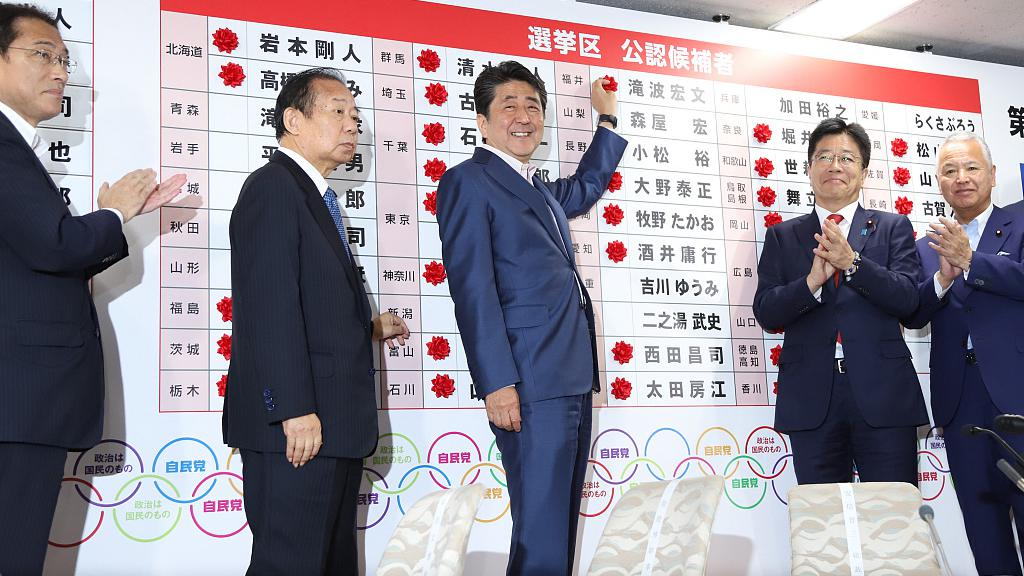
Japanese Prime Minister and leader of the ruling Liberal Democratic Party (LDP) Shinzo Abe (C) pins a rosette on the list of his party candidates in the upper house election at the LDP headquarters in Tokyo, July 21, 2019. /VCG Photo
Abe's foreign policies
Japan wants to make every effort to reduce tension between the United States and Iran before responding to an expected U.S. request to send its navy to guard strategic waters off Iran, Abe said Monday.
Japanese media have said a U.S. proposal to boost surveillance of Middle East oil shipping lanes off Iran and Yemen, where the United States says Iran and its proxies have carried out tanker attacks, could be on the agenda during this week's visit by U.S. National Security Adviser John Bolton.
Abe said that before making a decision on joining the United States, Japan would like to fulfill what it sees as a unique role it has to play in reducing tension.
"We have a long tradition of friendship with Iran and I've met with its president any number of times, as well as other leaders," Abe said. "Before we make any decisions on what to do, Japan would like to make every effort to reduce tensions between Iran and the United States."
Japan needed to gather information on what the United States is thinking and what it hoped to accomplish, Abe said, adding that the two allies remained in close contact.
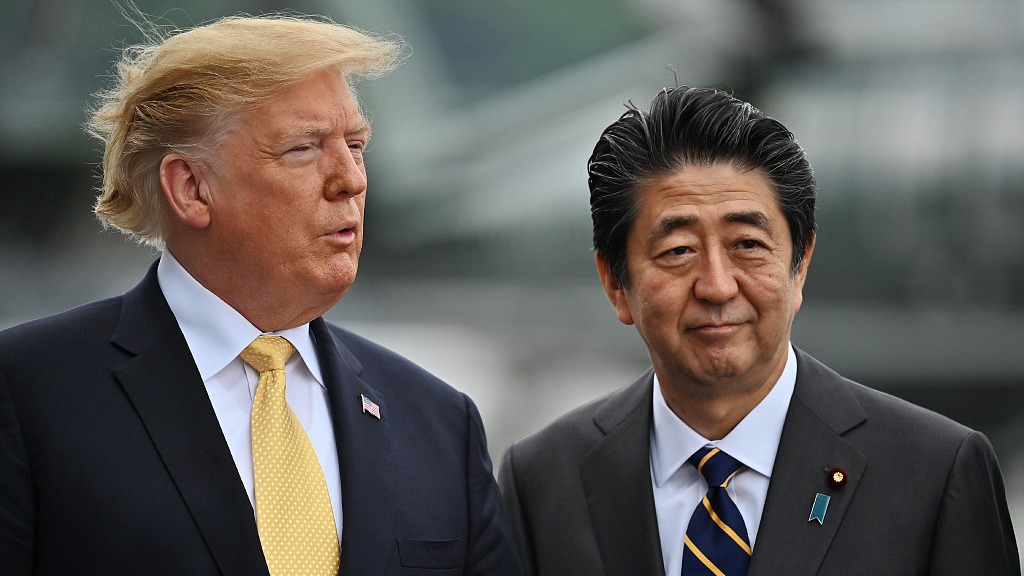
U.S. President Donald Trump (L) and Japan's Prime Minister Shinzo Abe go on board the Japanese navy ship Kaga in Yokosuka, Japan, May 28, 2019. /VCG Photo
U.S. President Donald Trump has made clear he's unhappy over Japan's 67.6-billion-U.S.-dollar trade surplus with the U.S. and said he expected an announcement on a deal after the upper house poll.
The two sides are working on an agreement involving agriculture and autos that could be clinched in September, but talks are fluid. Any agreement would likely be just part of a broader deal sought by Trump, who has threatened to put 25 percent tariffs on imported Japanese cars.
Polls have shown they appreciate Abe's efforts to build a relationship with Trump amid concerns over the stability of the U.S.-Japan alliance. Voters have also supported his hard line on recent disputes with neighboring South Korea.
Abe is expected to maintain a tough stance in a bitter feud with South Korea over compensation for South Koreans forced to work for Japanese occupiers during World War Two. The dispute worsened this month when Japan tightened export controls on high-tech materials to South Korea.
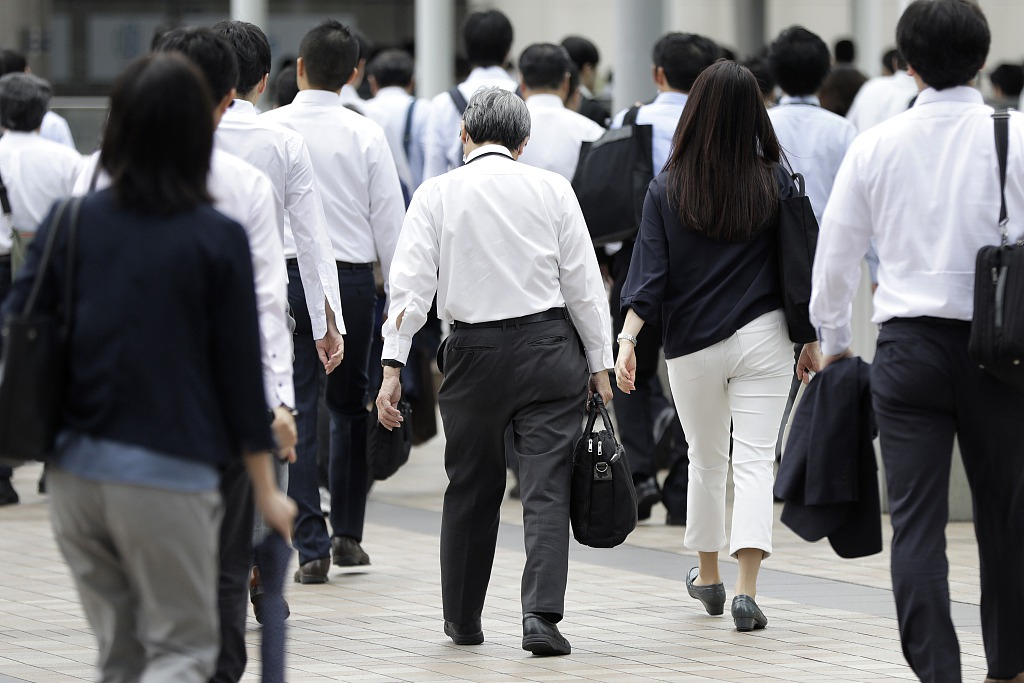
Tax hike scheduled in October
After a plan to raise the consumption tax from 8 to 10 percent was twice postponed, Abe's victory assures that a scheduled sales tax rise will take place in October.
The sales tax increase is intended to help rein in the globe's biggest debt load, which stems from increased social welfare spending for Japan's rapidly aging population. The government has raised the tax twice since it was introduced in 1989, and both times saw an economic slide.
More than six and a half years of "Abenomics" have brought the economy back on a recovery path but growth remains slow with tepid consumer spending. The tax hike was opposed by 57 percent of respondents to NHK's exit poll Sunday.
Abe said the vote showed the public approved of his government's guidance of the economy.
"Everyone said it would be no easy task to get a majority while promising a tax hike, but I think we were able to get the public's understanding," he told NHK.
The LDP and Komeito said the tax hike is necessary to generate revenues for expanding child-care support as promised. Opposition parties such as the CDPJ are against the tax increase, saying their focus is on protecting households.
Amid the rapid graying of the population, Japan's public pension system has also emerged as a major issue since the government's refusal to accept a report by a Financial Services Agency panel, providing the opposition with ammunition to attack Abe's government for trying to hide an inconvenient truth.

Copyright © 2018 CGTN. Beijing ICP prepared NO.16065310-3
Copyright © 2018 CGTN. Beijing ICP prepared NO.16065310-3